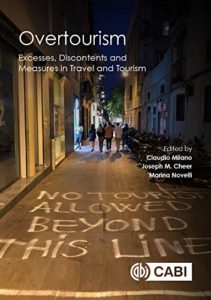Buchtipp: Overtourism
Drei Forscher aus drei verschiedenen Ländern haben wich wissenschaftlich dem Thema Overtourism gewidmet und jüngst die Ergebnisse in Buchform herausgegeben: Claudio Milano, Ostelea School of Tourism and Hospitality – University of Lleida (Spanien), Joseph M. Cheer, Wakayama University (Japan), und Maria Novelli, University of Brighton (UK).
The „overtourism“ phenomenon is defined as the excessive growth of visitors leading to overcrowding and the consequential suffering of residents, due to temporary and often seasonal tourism peaks, that lead to permanent changes in lifestyles, amenities and well-being. Enormous tensions in overtourism affected destinations have driven the intensification of policy making and scholarly attention toward seeking antidotes to an issue that is considered paradoxical and problematic.
Moving beyond the „top 10 things you can do about overtourism,“ this book examines the evolution of the phenomenon and explores the genesis of overtourism as well as the system dynamics underpinning it. With a rigorous scientific approach, the book uses systems-thinking and contemporary paradigms around sustainable development, resilience planning and degrowth; while considering global economic, socio-political, and environmental discourses. This book:
– Deconstructs „overtourism“ and considers the many constituent parts that have led to its current conceptualizations;
– Presents globally diverse views of overtourism through numerous case studies;
– Is written in plain language accessible to readers beyond the academic context.Researchers, analysts, policy makers and industry stakeholders working within tourism as well as those within the private sector, community groups, civil society groups and NGOs will find this book an essential source of information.
Zu bestellen ist das Werk beispielsweise über den Verlag Cabi, oder über die UNWTO, wo man auch nur den Band II mit den Case Studies beziehen kann.


Kommentieren